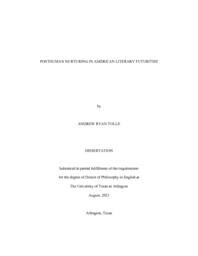
ATTENTION: The works hosted here are being migrated to a new repository that will consolidate resources, improve discoverability, and better show UTA's research impact on the global community. We will update authors as the migration progresses. Please see MavMatrix for more information.
Show simple item record
| dc.contributor.advisor | Fay, Jacqueline | |
| dc.contributor.advisor | Matheson, Neill | |
| dc.creator | Tolle, Andrew Ryan | |
| dc.date.accessioned | 2023-06-28T14:27:27Z | |
| dc.date.available | 2023-06-28T14:27:27Z | |
| dc.date.created | 2021-08 | |
| dc.date.issued | 2021-08-16 | |
| dc.date.submitted | August 2021 | |
| dc.identifier.uri | http://hdl.handle.net/10106/31359 | |
| dc.description.abstract | This dissertation applies posthuman theories to the concept of nurture in American literatures of 1880-1920 and 1980-2020 to explore how writers construct and imagine futurities that increasingly critique the liberal Cartesian human. While relationships between “subjects” and “objects” in Cartesian dualism can render the act of nurturing both problematic and violent, posthuman nurture decenters the nurturer, shifting focus onto the nurtured. This allows us to view nurture as an inherently mutual act that includes agencies beyond humans, including animals, plants, and other non-zoe. American literatures of 1880-1920, which often speculated futures taking place in 1980-2020, exhibit nascent strains of the “posthuman condition,” decentering the human to nurture utopian futures. Marginalized authors during 1880-1920, such as queer and BIPOC writers, offer “subaltern futures” as alternatives to utopias written by white writers, in which kinnovation becomes a form of nurturing futures from which they were otherwise excluded. Once writers of 1980-2020 experienced and/or lived past those futures imagined one century prior, their texts reimagine what utopias can realistically entail; this leads to an emergent form of fiction that explores posthuman (and post-human) nurturing ethics, particularly those relating to the figure of the child. Moreover, writers of 1980-2020 develop ways of blending biogenetic and nonbiogenetic kinship networks, allowing kinnovation to remain responsive to issues related to the “primal wound” that are emphasized by the voices of adoptees, former foster youth, and first parents. This dissertation explores how challenges to the capitalist unit of “The Family” appear in American literatures and how relationships of power influence acts of nurture. Authors examined include Edward Bellamy, Charlotte Perkins Gilman, Alice Ilgenfritz Jones & Ella Merchant, Edward Prime-Stevenson, S. Alice Callahan, Lillian Jones Horace, Frances E. W. Harper, Lydia Millet, and Joanne Ramos. | |
| dc.format.mimetype | application/pdf | |
| dc.language.iso | en_US | |
| dc.subject | Posthumanism | |
| dc.subject | Nurture | |
| dc.subject | American literature | |
| dc.subject | Agency | |
| dc.subject | New materialism | |
| dc.subject | Intra-actions | |
| dc.subject | Futurity | |
| dc.subject | Utopia | |
| dc.subject | Dystopia | |
| dc.subject | Adoption | |
| dc.subject | Foster care | |
| dc.subject | Surrogacy | |
| dc.subject | Parenting | |
| dc.subject | Reproduction | |
| dc.subject | Climate change | |
| dc.subject | Queer theory | |
| dc.subject | Bellamy | |
| dc.subject | Nineteenth century | |
| dc.subject | Digital revolution | |
| dc.subject | Subject | |
| dc.subject | Object | |
| dc.subject | Kinship | |
| dc.subject | Temporality | |
| dc.subject | Evolution | |
| dc.subject | Progressive era | |
| dc.subject | Subaltern | |
| dc.title | POSTHUMAN NURTURING IN AMERICAN LITERARY FUTURITIES | |
| dc.type | Thesis | |
| dc.date.updated | 2023-06-28T14:27:27Z | |
| thesis.degree.department | English | |
| thesis.degree.grantor | The University of Texas at Arlington | |
| thesis.degree.level | Doctoral | |
| thesis.degree.name | Doctor of Philosophy in English | |
| dc.type.material | text | |
| dc.creator.orcid | 0000-0003-0902-7384 | |
| local.embargo.terms | 2023-08-01 | |
| local.embargo.lift | 2023-08-01 | |
Files in this item
- Name:
- TOLLE-DISSERTATION-2021.pdf
- Size:
- 949.9Kb
- Format:
- PDF
- Name:
- Dissertation FOR LIBRARY.docx
- Size:
- 281.1Kb
- Format:
- Microsoft Word 2007
This item appears in the following Collection(s)
Show simple item record


